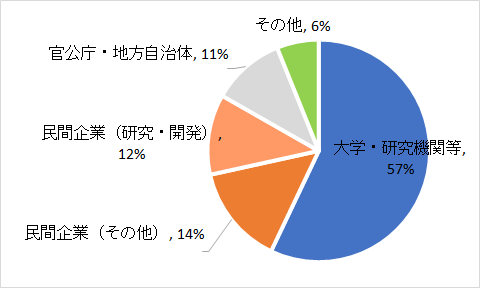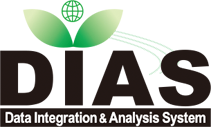Report on DIAS User Survey 2024
From January to February 2024, we conducted a web survey of DIAS account holders. We were very grateful to receive so many responses despite the open-ended questions.
DIAS is a research and development project. Its main objectives are to produce research results and their social implementation. It is essential for the DIAS project to advance research and development based on feedback from users, such as usage reports and requests, and the responses to the questionnaire are precious. We consider that answering the survey is a contribution to the DIAS project. Thank you very much for your cooperation.
This questionnaire was conducted in Japanese and English, and we received 573 responses. 77% of the responses were in Japanese, and 23% were in English. We will now report the results of the responses we received.
Affiliation of DIAS account holders
Around 60% were research institutions (universities, research and development corporations, etc.), around 1/4 were private companies, and around 10% were government offices and local governments. The 'Other' category included responses from NPOs, individuals, etc. The results were similar to those of the survey conducted in 2023.

How account holders discovered the DIAS
The ways people discovered DIAS included through word of mouth, introductions at events, and web searches.
Account holders' interests when registered with DIAS
We found that people registered with DIAS for various reasons, such as using specific datasets, using them for research or work, and being interested in environmental issues and climate change. The datasets that people registered with DIAS for included the JRA series, XRAIN, and d4PDF. Some people also registered because they were interested in meteorological, climate change, and reanalysis data.
The way account holders use DIAS
We received responses indicating that DIAS is being used for various purposes, including downloading data for specific research and projects, analyzing meteorological and climate data, and using it for educational purposes. Responses regarding research and academic purposes included climate change and meteorological impact, environmental and ecological research, disaster risk and disaster prevention research, and climate modeling and analysis.
Account holders' problems with their research or work
We received many responses regarding issues and needs regarding data downloads from DIAS, such as 'the download speed is slow.' Since many users download data from DIAS, downloading may take a long time, or the connection may become unstable. DIAS does not restrict download speeds and provides data on a best-effort basis. Please consider avoiding large-volume downloads at one time and changing the time of day.
We have received comments regarding the data format. DIAS publishes the files provided by the data creators as they are. We do not convert them to a specific data format. Please understand.
In addition, as downloading data is becoming increasingly difficult and there is a growing demand for data analysis functions that can flexibly handle data format conversion, etc., we are considering providing an environment for on-site data processing and analysis using JupyterLab. Please wait a little longer for the scheme to use this environment.
Meanwhile, we have also received much feedback on the DIAS analysis environment. The DIAS project is currently accepting applications for new joint research (free of charge) projects using the 'DIAS analysis environment.' If you are looking for new functions, why not develop them with us through this joint research system? If you have a project in mind, please apply. Please see this page (in Japanese) for more information on joint research (free of charge) projects.
Miscellaneous
We have received a lot of feedback on various aspects of using DIAS. We may ask you to be interviewed individually. We may respond to some of the opinions and questions by email. We will also continue to improve the FAQ page to provide some answers to the questions we have received.
We are discussing how to respond to each opinion to improve the DIAS service.
We will continue to conduct regular surveys and consider improvements to the system that reflect your wishes and opinions. Thank you for your continued support of DIAS.

